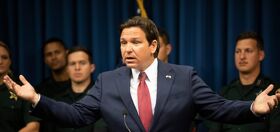
Democratic Presidential candidate Bill Richardson‘s turning up the gay-friendly heat. Last week, we heard the news that New Mexico’s 59-year old Governor will be appearing at Cedar Rapid, Iowa’s gay pride. Now comes Richardson’s first sit down with the gay press.
Unlike some candidates, who let homo-journos chase them down for a paltry sound byte, Richardson approached IN Los Angeles‘ Karen Ocamb while she interviewed his deputy Governor, Diane Denish.
Richardson’s invitation comes as a breath of fresh air for another reason: unlike his primary competitors – Hillary Clinton, Barack Obama and John Edwards – Richardson’s yet to release a comprehensive statement on LGBT rights. In fact, he has a history of keeping intentionally mum, especially with regard to marriage.
As Ocamb notes, Richardson dodged the the issue of gay marriage as recently as May 21th. While some activists would wag a finger at such silence, United Food and Commercial Workers Union leader and avowed homosexual John A. Perez defends Richardson. He tells Ocamb:
I think his silence spoke to the fact that he thinks about this issue in a lot more complicated and nuanced ways than we’re used to candidates speaking about it, and when you look at his track record as governor of New Mexico, I think he really has been one of the most progressive governors in a not very progressive state, with respect to a whole host of issues in the LGBT community.
Since taking office in January, 2003, Richardson’s repeatedly fought a conservative Senate to help pass laws protecting all citizens. New Mexican lawmakers under Richardson’s reign passed both hate crime and non-discrimination laws that address sexual orientation and gender identity. Richardson also called a special session of the state government to address domestic partnerships. (Although, opponents may point out that his landmark – and ultimately unsuccessful – push for same-sex state insurance benefits came just weeks after a lesbian couple filed an ACLU-sponsored suit against the state for retirement benefits.)
How about we take this to the next level?
Our newsletter is like a refreshing cocktail (or mocktail) of LGBTQ+ entertainment and pop culture, served up with a side of eye-candy.
While a member of Congress – a post he held for fourteen years, most of which he spent ironing out the United State’s international relations – Richardson voted against President Bill Clinton’s Don’t Ask, Don’t Tell, a small step in his take on so-called gay issues. Ocamb asked Richardson if he regards gays as a particular social “class”, to which the Governor replies:
No. I believe that gay people are part of the American mainstream. I would not treat gay people as a minority. I would treat them as individuals that should have full rights. I would support civil unions for gay people. I would support a national effort to eliminate discrimination of gay people–a federal domestic partners law. I would be an advocate for these issues, not somebody who talks about them and then does nothing. I would also get rid of ‘Don’t Ask, Don’t Tell,’ because we’ve got men and women who serve this country who should be honored for their service–not quizzed about their sexual predilections. So that would go right away, should I be elected president.
Richardson goes on to say that he’d like to “promote” laws that “cover all Americans”. “I would be for protecting gays, whatever it takes… Let them have full rights… I would be an activist on these issues.” Gay marriage loyalists will certainly balk at Richardson’s endorsement of the Defense of Marriage Act. In fact, one reader recently commented on Richardson, “I just can’t support a candidate who supports DOMA, otherwise I’d love to support Richardson, because he’s the most distinguished man in the race.” Richardson’s stance on marriage may leave a bit to be desired, but perhaps the issue of marriage isn’t the most important in these times of war and famine.
Richardson’s quick to point out that his DOMA vote came under political pressure from his fellow Democrats, particularly President Clinton, “I was the chief deputy Democratic Whip and it was a party vote and president Clinton wanted it.” He goes on to defend his vote:
I believe this issue is too divisive. I want the states to handle it. Probably was not necessary. I want to be positive and realistic in approaching gay rights issues. I think we’ve got a long way to go to advance them.
The affable politico then promises again to be an “activist president”. Not only does he vow to strike down Don’t Ask, Don’t Tell, but he’s dedicated to combat the frightening – and scarcely examined – AIDS pandemic:
I would re-invigorate the federal AIDS Commission–put activist members on it. I would give it strength in the bureaucracy. I would consider creating a Cabinet-level entity to deal with AIDS. I would consider that–I want to work it through. But as chair of the AIDS Commission–I would elevate it to the vice president heading it because that gives it importance. You know like the way in the Clinton-Gore administration, it was understood that Gore handled environmental issues, he handled technology issues. My vice president would handle AIDS internationally.
…
I would make the elimination of AIDS, along with the elimination of international poverty, and issues related to women– sexual slavery [and] gender-based violence–major parts of my presidency.
Richardson definitely has a history of supporting AIDS funding. New Mexico’s Department of Health found itself without funding in 2004 and Richardson’s office gave them the money to keep the HIV/AIDS program in action.
Richardson pulls his “gay” vision together when he again tells Ocamb that we need to be pragmatic about the steps we take toward complete civil and political integration. Decision-makers need to make the decisions as they come along, not push for what may be viewed as a massive cultural revolution, such as fighting for full marriage rights:
I believe you’ve got to be politically realistic. What you want to do is create conditions that address issues that I believe, in the short term, the American people support and understand like non-discrimination on the basis of insurance, like ‘Don’t Ask, Don’t Tell,’ finding ways to fund AIDS more extensively–basic protections [like] domestic partnerships–that’s where we should focus. All I’m saying is that I would be a very strong advocate in this area.
Richardson’s approach isn’t the most revolutionary, but it’s better than the poll-pandering promises other candidates proclaim. And may be more effective, as well.



















